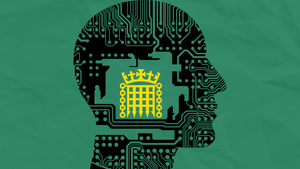The ongoing game of parliamentary ping pong between the House Of Commons and House Of Lords over amendments to the controversial Data Bill continues, with the government employing what The Guardian calls “an arcane parliamentary procedure” to get AI transparency measures proposed by the Lords removed from the bill for a second time.
Both the Commons and the Lords must vote in favour of the bill for it to become law, and the legislation is now in the final stages of negotiation.
That “arcane” procedure hinges on so-called “financial privilege” rules, which say that the House of Commons has the final say when it comes to public spending, and can overrule proposals from the Lords if they have cost implications. Government ministers argue that implementing the transparency measures wanted by the Lords would require time - and therefore public money - meaning they can veto them.
Lords member Beeban Kidron - the film-maker who has spearheaded attempts to get transparency obligations inserted into the Data Biill - was scathing of the latest development, saying, that “people are gobsmacked that the government is playing parliamentary chess with their livelihoods”, not just “across Parliament” but also “across the creative and business community”. Speaking to The Guardian, Kidron said that it is “astonishing that a Labour government would abandon the labour force of an entire sector”.
Ministers don’t want copyright issues posed by AI to be addressed in the Data Bill, but Kidron and her allies in the Lords are still trying to get wording included that would force AI companies to detail any copyright protected works they use to train AI models.
Unsurprisingly that measure is widely supported by the creative industries, including the music industry, which wants a lot more clarity about what content AI companies are using to train generative AI. That clarity might also allow some rightsholders to sue AI firms that have used their content without permission.
MPs in the House Of Commons - where the government has a massive majority meaning that most Labour MPs toe the party line dictated by ministers - previously removed that wording from the bill, but the more politically balanced Lords put it back in on Monday.
If what the Lords are demanding becomes law, the government will have to introduce regulations forcing AI companies operating in the UK to “provide copyright owners with information regarding the text and data used in the pre-training, training, fine-tuning and retrieval-augmented generation in the AI model, or any other data input to the AI model”.
The government insists that it will still deal with copyright issues raised by AI - including transparency issues - but that this should be done via separate legislation informed by its recent consultation on copyright and AI, rather than being rushed into law through the Data Bill. Culture minister Chris Bryant defended this position in the House Of Commons again yesterday.
Meanwhile a spokesperson from the government’s Department For Science, Innovation And Technology told reporters: “We want our creative industries and AI companies to flourish, which is why we have been separately consulting on a package of measures that we hope will work for both sectors. We have always been clear that we will not rush into any decisions or bring forward any legislation until we are confident that we have a practical plan which delivers on each of our objectives”.
Despite these latest developments, Kidron has not yet given up on her bid to get the transparency obligations into the final version of the Data Bill. When the legislation returns to the Lords on Monday she will table a rephrased version of her amendment, hoping to remove those aspects that allow the ‘financial privilege’ of the Commons to be invoked.
Expanding on her criticism of the latest developments, she added: “The government failed to answer its own backbenchers who repeatedly asked ‘if not now then when?’ and the minister replied with roundtable reviews and spurious problems about technical solutions. It is for government to set the law and incentivise companies to obey it, not run roundtables trying to work out technical solutions that they are not fit to provide”.
"My inbox is filled with individual artists and global companies who are bewildered that the government would allow theft at scale and cosy up to those who are thieving”, she added, noting that “there is another way, but this government have chosen to ignore it”.

